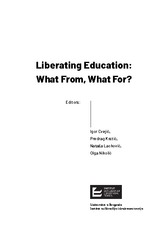Deliberative Education and Quality of Deliberation: Toward a Critical Dialogue and Resolving Deep Disagreements
Поглавље у монографији (Објављена верзија)
Метаподаци
Приказ свих података о документуАпстракт
This paper consists of two main parts.1 First, I discuss the results of recent empirical research on deliberation in deeply divided societies and outline why the occurrence of deliberative transformative moments (DTM) in deliberative discussions offers significant reasons for optimism regarding the applicability of the fundamental ideas of deliberative democracy. I will examine the increase of positive DTMs and consider how the quality of deliberation could be increased. As we will see, efficient deliberation must strive for more than just its stated fundamental goals – a better understanding of how citizens rank their preferences and the views they defend during deliberative discussions. Attempting to show how that can be effectively accomplished, in the second part of the paper I will formulate an approach consisting of two elements: a descriptive measure of the quality of deliberation – the DQ index, and a normative standard that can help us build a framework for constructive critic...al discussion – Grice’s conversational maxims based on his cooperation principle, as well as his view of conversational implicatures. The ideal goal of such an endeavour, I will claim, is to show that deliberative education can help future voters achieve citizen emancipation by adopting Kant’s advice ‘dare to think’ and expanding it with the advice to ‘dare to be proven wrong on the strength of a better argument’.
Кључне речи:
deliberative democracy / deliberative education / emancipation / conversational implicatures / conversational maximsИзвор:
Liberating Education: What From, What For?, 2021Издавач:
- Beograd : Institut za filozofiju i društvenu teoriju
Финансирање / пројекти:
- Министарство науке, технолошког развоја и иновација Републике Србије, институционално финансирање - 200025 (Универзитет у Београду, Институт за филозофију и друштвену теорију) (RS-MESTD-inst-2020-200025)
Колекције
Институција/група
IFDTTY - CHAP AU - Šoć, Andrija PY - 2021 UR - http://rifdt.instifdt.bg.ac.rs/123456789/2512 AB - This paper consists of two main parts.1 First, I discuss the results of recent empirical research on deliberation in deeply divided societies and outline why the occurrence of deliberative transformative moments (DTM) in deliberative discussions offers significant reasons for optimism regarding the applicability of the fundamental ideas of deliberative democracy. I will examine the increase of positive DTMs and consider how the quality of deliberation could be increased. As we will see, efficient deliberation must strive for more than just its stated fundamental goals – a better understanding of how citizens rank their preferences and the views they defend during deliberative discussions. Attempting to show how that can be effectively accomplished, in the second part of the paper I will formulate an approach consisting of two elements: a descriptive measure of the quality of deliberation – the DQ index, and a normative standard that can help us build a framework for constructive critical discussion – Grice’s conversational maxims based on his cooperation principle, as well as his view of conversational implicatures. The ideal goal of such an endeavour, I will claim, is to show that deliberative education can help future voters achieve citizen emancipation by adopting Kant’s advice ‘dare to think’ and expanding it with the advice to ‘dare to be proven wrong on the strength of a better argument’. PB - Beograd : Institut za filozofiju i društvenu teoriju T2 - Liberating Education: What From, What For? T1 - Deliberative Education and Quality of Deliberation: Toward a Critical Dialogue and Resolving Deep Disagreements UR - https://hdl.handle.net/21.15107/rcub_rifdt_2512 ER -
@inbook{
author = "Šoć, Andrija",
year = "2021",
abstract = "This paper consists of two main parts.1 First, I discuss the results of recent empirical research on deliberation in deeply divided societies and outline why the occurrence of deliberative transformative moments (DTM) in deliberative discussions offers significant reasons for optimism regarding the applicability of the fundamental ideas of deliberative democracy. I will examine the increase of positive DTMs and consider how the quality of deliberation could be increased. As we will see, efficient deliberation must strive for more than just its stated fundamental goals – a better understanding of how citizens rank their preferences and the views they defend during deliberative discussions. Attempting to show how that can be effectively accomplished, in the second part of the paper I will formulate an approach consisting of two elements: a descriptive measure of the quality of deliberation – the DQ index, and a normative standard that can help us build a framework for constructive critical discussion – Grice’s conversational maxims based on his cooperation principle, as well as his view of conversational implicatures. The ideal goal of such an endeavour, I will claim, is to show that deliberative education can help future voters achieve citizen emancipation by adopting Kant’s advice ‘dare to think’ and expanding it with the advice to ‘dare to be proven wrong on the strength of a better argument’.",
publisher = "Beograd : Institut za filozofiju i društvenu teoriju",
journal = "Liberating Education: What From, What For?",
booktitle = "Deliberative Education and Quality of Deliberation: Toward a Critical Dialogue and Resolving Deep Disagreements",
url = "https://hdl.handle.net/21.15107/rcub_rifdt_2512"
}
Šoć, A.. (2021). Deliberative Education and Quality of Deliberation: Toward a Critical Dialogue and Resolving Deep Disagreements. in Liberating Education: What From, What For? Beograd : Institut za filozofiju i društvenu teoriju.. https://hdl.handle.net/21.15107/rcub_rifdt_2512
Šoć A. Deliberative Education and Quality of Deliberation: Toward a Critical Dialogue and Resolving Deep Disagreements. in Liberating Education: What From, What For?. 2021;. https://hdl.handle.net/21.15107/rcub_rifdt_2512 .
Šoć, Andrija, "Deliberative Education and Quality of Deliberation: Toward a Critical Dialogue and Resolving Deep Disagreements" in Liberating Education: What From, What For? (2021), https://hdl.handle.net/21.15107/rcub_rifdt_2512 .



